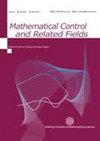Linear-quadratic-Gaussian mean-field-game with partial observation and common noise
IF 0.9
4区 数学
Q1 MATHEMATICS
引用次数: 7
Abstract
This paper considers a class of linear-quadratic-Gaussian (LQG) mean-field games (MFGs) with partial observation structure for individual agents. Unlike other literature, there are some special features in our formulation. First, the individual state is driven by some common-noise due to the external factor and the state-average thus becomes a random process instead of a deterministic quantity. Second, the sensor function of individual observation depends on state-average thus the agents are coupled in triple manner: not only in their states and cost functionals, but also through their observation mechanism. The decentralized strategies for individual agents are derived by the Kalman filtering and separation principle. The consistency condition is obtained which is equivalent to the wellposedness of some forward-backward stochastic differential equation (FBSDE) driven by common noise. Finally, the related \begin{document}$ \epsilon $\end{document} -Nash equilibrium property is verified.具有局部观测和共噪声的线性二次高斯平均场博弈
This paper considers a class of linear-quadratic-Gaussian (LQG) mean-field games (MFGs) with partial observation structure for individual agents. Unlike other literature, there are some special features in our formulation. First, the individual state is driven by some common-noise due to the external factor and the state-average thus becomes a random process instead of a deterministic quantity. Second, the sensor function of individual observation depends on state-average thus the agents are coupled in triple manner: not only in their states and cost functionals, but also through their observation mechanism. The decentralized strategies for individual agents are derived by the Kalman filtering and separation principle. The consistency condition is obtained which is equivalent to the wellposedness of some forward-backward stochastic differential equation (FBSDE) driven by common noise. Finally, the related \begin{document}$ \epsilon $\end{document} -Nash equilibrium property is verified.
本文章由计算机程序翻译,如有差异,请以英文原文为准。
求助全文
约1分钟内获得全文
求助全文
来源期刊

Mathematical Control and Related Fields
MATHEMATICS, APPLIED-MATHEMATICS
CiteScore
2.50
自引率
8.30%
发文量
67
期刊介绍:
MCRF aims to publish original research as well as expository papers on mathematical control theory and related fields. The goal is to provide a complete and reliable source of mathematical methods and results in this field. The journal will also accept papers from some related fields such as differential equations, functional analysis, probability theory and stochastic analysis, inverse problems, optimization, numerical computation, mathematical finance, information theory, game theory, system theory, etc., provided that they have some intrinsic connections with control theory.
 求助内容:
求助内容: 应助结果提醒方式:
应助结果提醒方式:


